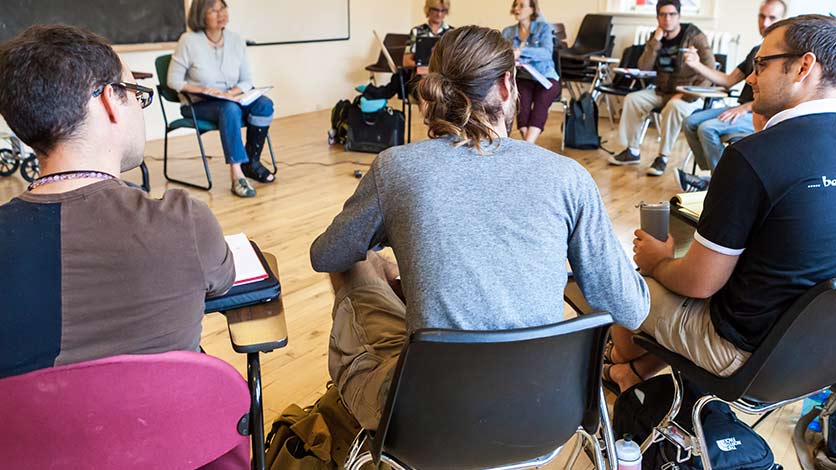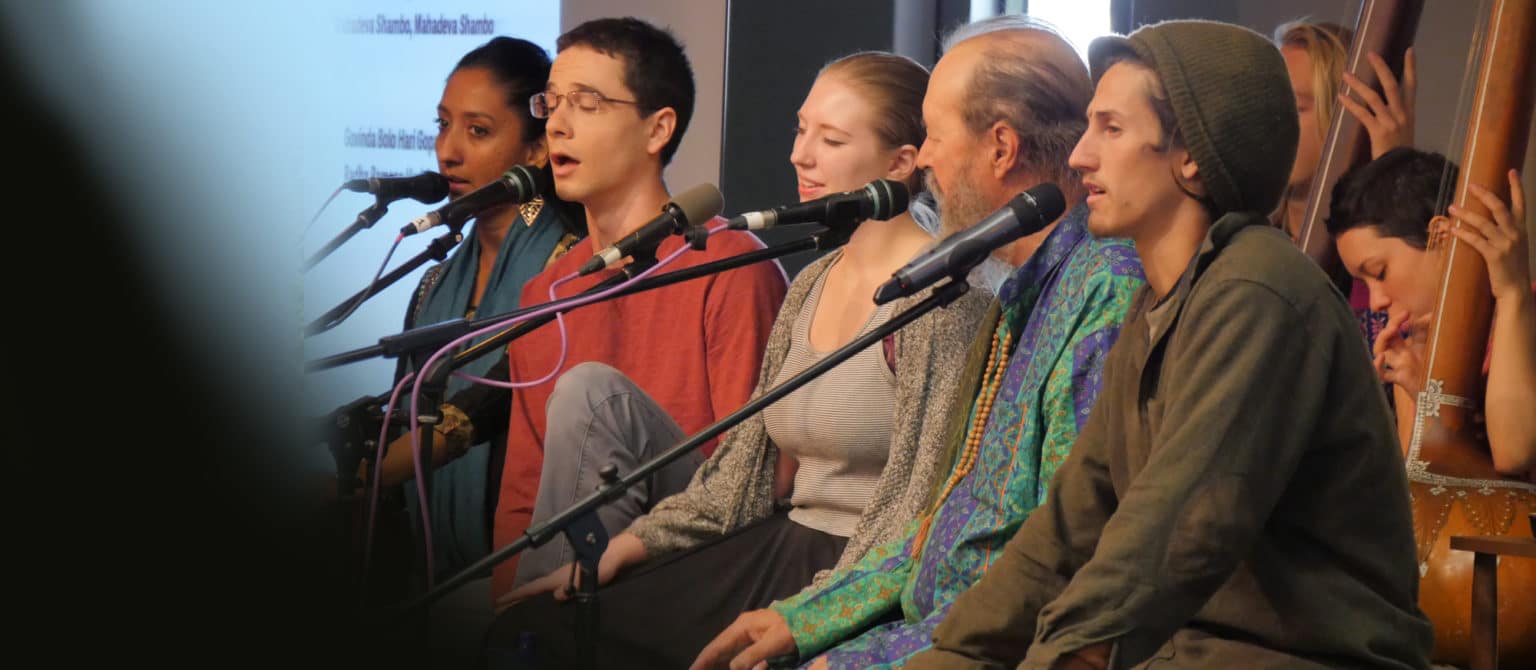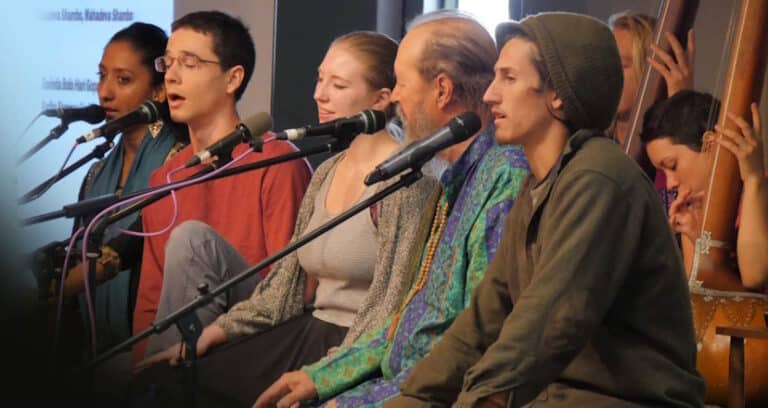BA in Religious Studies
Religious Studies Degree
Naropa’s Bachelor of Arts in Religious Studies offers students a unique opportunity to study religion from both a contemplative as well as an academic perspective, building a solid understanding of religion in society, and its relevance to the human experience.
Program Overview
Naropa’s Bachelor of Arts in Religious Studies offers courses that examine and explore the phenomenon of religion and its effect on individuals and culture.
Naropa’s approach to the study of religion is respectful, nonsectarian, contemplative, as well as critical. You will study religion from both a history of religions standpoint, as well as the perspective of the practitioner, and on occasion, experientially.
Diversity of Knowledge
Naropa’s Religious Studies program focuses on historical religious traditions and emerging forms of religious practice, including historical context, theoretical concepts, nomenclature, and an experiential understanding. Thus, students will be given the opportunity to gain a true understanding and appreciation of diverse cultures and beliefs in depth.
Contemplative Approach
Naropa’s contemplative approach challenges students to consider and/or reconsider religion from a personal and experiential perspective, and to understand the perspectives of others within religious traditions in context.
Collaborative Learning
Students will learn to articulate religious perspectives in a collaborative learning environment. This involves actively participating in group discussions and sharing insights.
Quick Facts
- 37 credit hours (of the 120 credits required for a bachelor's degree)
- Transfer up to 90 semester credits
- 2 group retreats
- 1 meditation intensive
- Contemplative approach
- Scholar-practitioner instructors
- Religious traditions focus
- Admissions open for 2025
Program Format
Naropa University’s undergraduate program is a four-year, fully accredited Bachelor of Arts Degree program. The Bachelor of Arts in Religious Studies is a 37-credit major in which students explore religion in a variety of ways, with an emphasis on contemplative practices and traditions. Course offerings include African, Buddhist, Christian, Hindu, Jewish, Muslim, and Sufi traditions.
All students must take a series of 12 credits that introduce the study of religion and contemplative practice.
Students also choose 9 credits from Religious Traditions courses, which serve as introductory studies of major world religions, 6 credits from Contemporary Issues in Religion courses, and 9 credits from Contemplative Practice courses.
Your religious studies degree will include a diversity of courses as rich and varied as jobs for religious studies graduates.

Course Spotlight
Meditation Practicum I: Freeing the Mind
Students delve into the Tibetan Buddhist tradition of shamatha-vipashyana through sitting meditation. Weekly lectures focus on experiential facets like understanding impermanence, managing emotions, and fostering maitri, or loving-kindness. Alongside lectures, students participate in weekly discussion groups and have individual sessions with meditation instructors. The course includes consistent daily meditation. Evaluation methods include both midterm and final oral exams.
Degree
Requirements
A Bachelor of Arts degree (120 credits) consists of a Core Curriculum (24 credits) and at least one major, as well as minors and/or elective courses of the student’s choosing.
The Religious Studies Major consists of 37 credit hours.
Religious Studies Major Requirements
Gateway: Choose 6 credits
REL-150 Buddhist Journey of Transformation: An Introduction (3)
REL-210 Religion and Mystical Experience (3)
REL-247 Embodying Sacred Wisdom: Modern Saints (3)
Milestone: 3 credits
REL-351 Theories of Alternative Spiritualities and New Religious Movements (3)
Religious Traditions Courses: Choose 9 credits
Choose 9 credits from the following courses:
REL-229 Contemplative Judaism (3)
REL-240 Integrating One’s Inner and Outer World through the Buddhist Science of Mind (3)
REL-314 Contemplative Islam: An Introduction to Its History, Thought, and Practice (3)
REL-321 Kabbalah and Consciousness (3)
REL-323 Religious Experience in Africa: Flash of the Spirit (3)
REL-325 Contemplative Christianity (3)
REL-334 Hindu Tantra (3)
REL-338 Sufism: an Introduction to Its History, Thought, and Practice (3)
REL-345 Zen Buddhism (3)
REL-346 Wisdom & Compassion: A Buddhist Path (3)
REL-355 Sanskrit in the Sacred Traditions of India (3)
TRA-453 Yoga History, Theory, and Philosophy (3)
Contemporary Issues in Religion Courses: Choose 6 credits
Choose 6 credits from the following courses:
REL-190 Special Topics in Religious Studies: Mindfulness Compassion Training(1)
REL-212 Queer Theory and Religion(3)
PAX-335 Socially Engaged Spirituality(3)
Contemplative Practice Courses: Choose 9 credits
Choose 9 credits from the following courses:
REL-158W World Wisdom Immersive Weekend (Spring) (1)
REL-160 Meditation Practicum I: Freeing the Mind(3)
REL-250 Spirituality and Creative Expression(3)
REL-255W World Wisdom Immersive Weekend (Fall) (1)
REL-271 Christian Prayer and Mystical Practices(3)
REL-345 Zen Buddhism(3)
TRA-133 Yoga I: Foundations(3)
TRA-463 Yoga Meditation(3)
Capstone: 4 credits
- COR-440 Capstone II(3)
- REL-485 BA Wisdom Traditions Retreat(1)
Total: 37 credits
Why Choose Naropa?
Scholar-Practitioner Faculty
At Naropa, you’ll learn from authors and scholars who have contributed widely to the field of religious studies. You’ll study with lineage holders—rabbis, yogis, ministers, and priests—who fully embody the teachings of their belief systems.
Unique Approach
Naropa is the only school in the West with a mission based on mindfulness and contemplative learning. With our religious studies program, you’ll explore religious traditions from Christianity to Sufism, experience contemplative practices from around the world, and examine the role of religion in contemporary culture.
Diversity Focus
Naropa’s commitment to diversity extends to our curriculum. Not only will you learn about many different religious traditions and their communities, but also about differences and cultural contexts within and across them.

How this Program Prepares You
Knowledge of Religious Traditions
Contemplative Practice
Students actively participate in and demonstrate their commitment to contemplative practices, engaging in a variety of reflective activities. Through their involvement, they express a deep connection with these practices, fostering a deeper understanding and integration of contemplation into their personal and academic lives.
Diverse Courses, Varied Careers
What You'll Learn
Knowledge of self
Dive deep into self-inquiry through our contemplative, Buddhist-inspired approach.
Diversity of Knowledge
Understand and appreciate diverse cultures and beliefs.
Community Involvement
Bring your most authentic selves to meaningful work.
Collaborative Learning
Become skilled at solving problems in a community of peers.
Transferable Skills
Gain valuable communication and problem-solving skills.
Career Opportunities with a BA Religious Studies
Many graduates of Naropa’s BA in Religious Studies program enter careers in writing, translating, and teaching, while many others go on to pursue advanced degrees in a range of fields.
- Religion Teacher: Teach students diverse religious principles and practices.
- Philosophy Teacher: Educate students in the principles and theories of philosophy.
- Museum Technician: Care for and maintain artifacts in museum collections.
- Museum Conservator: Preserve artifacts in museum collections using specialized techniques.
- Interpreter and Translator: Bridge language gaps for accurate communication.
- Area, Ethnic, and Cultural Studies Teacher: Educate students about specific regions, ethnicities, or cultures.
- Social Science Research Assistant: Help researchers collect and organize data for studies.
- Anthropologist: Study human societies, cultures, and artifacts to understand the diversity of human life.
- Archaeologist: Analyze artifacts and structures to understand past human societies.
- Historian: Analyze and interpret historical events to provide insights into the past.
Hear from a Graduate
The unique approaches I take to business are positively disruptive within my career field. I hope that my impact will continue to affect further positive change in my industry. I often find myself amazed and inspired by the way business-as-usual companies are leaning towards themes like authenticity, diversity, and civic engagement as unique value propositions—precisely the areas Naropa excels in teaching.
FAQs About the
BA Religious Studies
What is a Religious Studies Degree?
What can you do with a Religious Studies Degree?
What can I get out of a Religious Studies Degree?
What sets Naropa apart from other universities?
Naropa is the only school in the West with a mission based on mindfulness and contemplative learning. Naropa is uniquely equipped to prepare your intellect and your spirit for a meaningful future. Naropa’s Bachelor of Arts in Religious Studies equips you with the in-depth knowledge and interpersonal skills necessary for a meaningful and rewarding career.
Naropa is the first accredited university to bring contemplative education to the West, putting mindfulness at the heart of every pursuit we engage in. At Naropa, not only do we pursue academic excellence for our students and faculty alike, but we also foster community, self-reflection, and purposeful education to drive change in the world.
What is the difference between Theology and Religious Studies?
Learn More About the Program

Connect
with your counselor
Rachel Thompson
Assistant Director of Undergraduate Admissions
- 303-970-9831
- rachel.thompson@naropa.edu
- Schedule Appointment
Ready to Apply?
Admission Requirements
Naropa University’s unique approach values both academic excellence and the willingness to carry out introspective work.
Learn more about admission requirements and our application process.
Undergraduate Students
Students with a 3.0 GPA or Higher
Applicants with excellent academic performance are welcome with minimal requirements.
Students with Less than 3.0 GPA
If your academic record hasn’t been the strongest, but you wish to apply to Naropa, we strongly encourage you to submit your application. Contemplative practice matters to us just as much as academic excellence.
Transfer your college credit
We allow you to transfer 60 or more credits from previous institutions. Present an official college transcript on top of your application to apply as a transfer student.
Discover all requirements for first-time and transfer students at our admission requirements page.
International Students
No matter where you’re from or how far you’ve traveled, you can feel at home at Naropa. Our university is built on a foundation of inclusion, diversity, and welcoming other cultures with open arms. The more diverse our student body, the stronger we are. We value your future contributions to our dynamic community.
Learn more about applying to Naropa from abroad.
Costs and Financial Aid
At Naropa, we aim to enhance educational accessibility for a diverse student population. Explore our undergraduate costs & aids page to learn about tuition, grants, scholarships, and opportunities for financial assistance. Use our cost calculator to estimate your potential expenses at Naropa.
Undergraduate Scholarship Opportunities
Scholarships are a great way to help with the costs of going to school. Naropa University offers an array of scholarship opportunities to undergraduate students. Students may be eligible to receive scholarships through their admissions application, by applying for scholarships, or by being nominated for a scholarship. For more detailed information about the different scholarships available and how to receive them, please review our undergraduate scholarship page.




